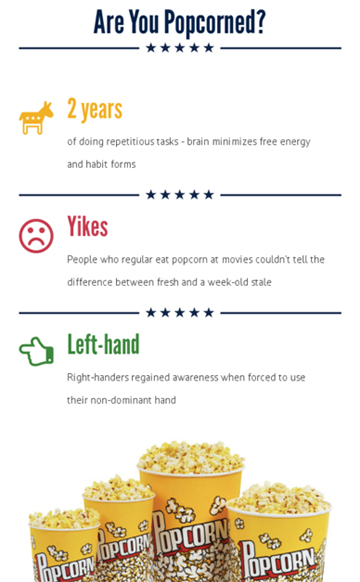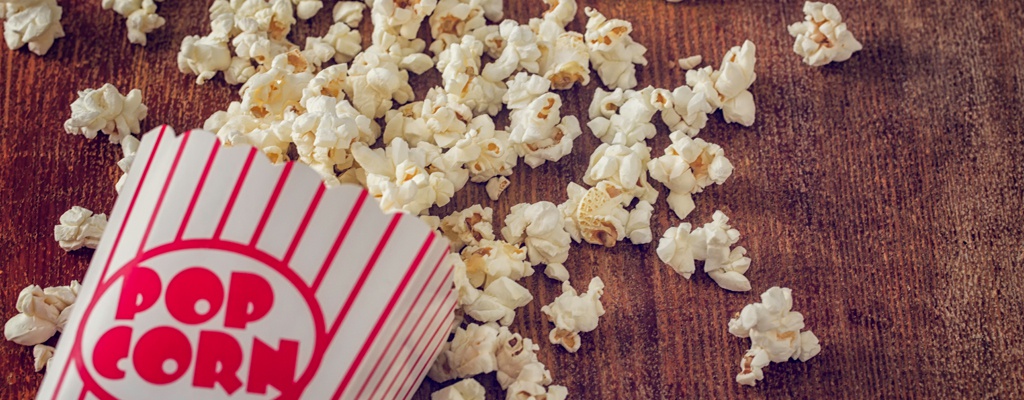“If you’ve been doing the same thing for more than 2 years, then you might as well be in a coma”
Dr David Rock, the founder of the Neuroleadership Institute, an integrated field that merges hard science with soft skills of leadership, stated during the American Society for Training and Development (Now known as ATD) one summer in Florida. What did he mean? Let me tell you a story about an intriguing experiment out of the University of Southern California, which was published in the journal Personality and Social Psychology Bulletin in 2011.
The experiment was about popcorn and the people who eat them. That’s right, popcorn – like the ones you find at movie theatres. The researchers focused on two groups of moviegoers; ones who regularly enjoyed these delicious treats and the others who rarely ate them. Let us call these popcorn personalities 1) the “Yes, please” and 2) the “No, thanks”.
The groups were tagged and then offered some popcorn during their movie going experience. In the bucket, researchers put in two types of popcorn. One was freshly popped and another was about a week old. The mix was handed to both groups. And the organizers then sat back and waited to see what would happen.
What do you think?
From my own survey with participants in the room, most people think that the “Yes, please” group would only go for the fresh popcorn. After all, these were ‘professional’ popcorn eaters so they should know what they were doing, right? Perhaps it was the same logic that an employee who has been doing a job for many years should know it more than anyone else?
That’s what I had thought, too. The results of this experiment, however, showed otherwise. It turned out that people who were ‘smart’ about selecting fresh popcorn were instead the “No, thanks” group. The “Yes, please” were indifferent of new vs. stale popcorn. They would eat them both! Truly intriguing was when experimenters asked the “Yes, please” group to repeat the task; only this time its members were asked to use their non-dominant hand.
That’s right, to use only their non-dominant hand. If they were right-handed, then they had to use their left hand to pick up the popcorn. If they were left-handed, like me, then it was the right hand. Amazingly the results flipped. The “Yes, please” group now exhibited selective behavior for fresh popcorn just like the “No, thanks” group. Forcing them to do what they were not accustomed appeared to restore awareness. Their brain can now distinguish between what is good and what is bad.

What to make of these results?
Leadership Insights
The brain operates in ‘economy mode’. In simple terms, our brain is frugal. The brain tries to find the most energy-efficient path to get its desired output. When the brain learns something for the first time, it uses a lot of energy. Basically, it needs to think. However, doing the same repetitive work for a while the brain discovers that it can save a lot of energy by merely carrying out the act. This is what we know as habits, like locking your car, driving home, or taking a shower in the morning.
The myth about experience. Given the implication, is it always true that people with a lot of experience know the most? Our understanding of the brain might suggest otherwise. The experienced popcorn eaters relied on their habit more than their forebrain. They were not ‘thinking’ about eating the popcorn. It was not until they were asked to use their non-dominant hand that their brain was subsequently forced into an active mode. So, don’t just rely on the veterans in the team; bring in a fresh perspective – someone who asks ‘stupid questions’. Listen to them and see if they saw something the experienced may have missed.
Quint Studer, author of Hardwiring Excellence: Purpose, Worthwhile Work, Making a Difference, wrote about a practice at his hospitals called The-First-30-Days. After a month into the job, new employees are gathered to share what they have seen that seems ‘strange’. It could be as complex as an MRI preparation procedure he/she used at the prior workplace. Or as simple as “I was wondering why the microwave here took so long to heat up our food”. The rule is everyone else can only listen. No explanations or rebuttal are allowed.
Quint explained that most organizations assume it is natural for seniors to mentor juniors. But valuable insights could be drawn from reversing the process as well – getting your houseguests to see what your home has been missing. By the way, the microwave catch was an actual example. The hospital improved their staffs’ return-to-work time after it placed a more powerful microwave in the pantry. This is an example of not becoming ‘popcorned’.
Lead you brain. If we do something repetitive for a while (like writing that marketing plan using the same excel template for 2-3 years consecutively), our brain switches off and operates in ‘economy’ mode – no thinking required. What the experiment also taught us, fortunately, was that we can do something about it. Don’t let your brain settle into repeating patterns. Come to work using different routes, disrupt the morning routines, allowing ideas you disagree with to take shape, read different types of books, volunteer for unconventional tasks, rearrange the office, start with a fresh template – the possibilities are endless.
Intriguing, isn’t it? This is yet another reason why organizations should actively develop leaders. Ask your people to experiment with their sense of urgency for change. Force their forebrain to look for ‘cracks in the iceberg’, as the leadership guru, Professor John P. Kotter would say. A Litmus Test: Is the first thing your people think of when getting to the office in the morning: “where to have lunch today?” If the answer is closer to ‘yes’, then there might be a red flag that everything else between breakfast and lunch has become habits.
Dr Rock concluded his session with this gem.
“Do your people actually have 20 years of experience, or simply a 2-year experience repeated ten times?”

Dr Thun Thamrongnawasawat (Tan) is one of the foremost experts on dissecting complex management and business models and cascading them for easy implementation by companies across different industries. His innovative B.A.S.E. model has inspired numerous organizations to transform. He’s the author of the Brain-BASEd Leadership book series (2013-2016), a bestselling The Leadership Journey (2018) and a regular newspaper columnist. In 2015, Dr Thun was the recipient of World HRD Congress’s “Global Coaching Leadership Award” and named “Consultant of the Year” by the Ministry of Industry, Thailand.
He can be contacted at thun@asb.edu.my.
If you are interested to know more about our exciting Executive Education program click here.





